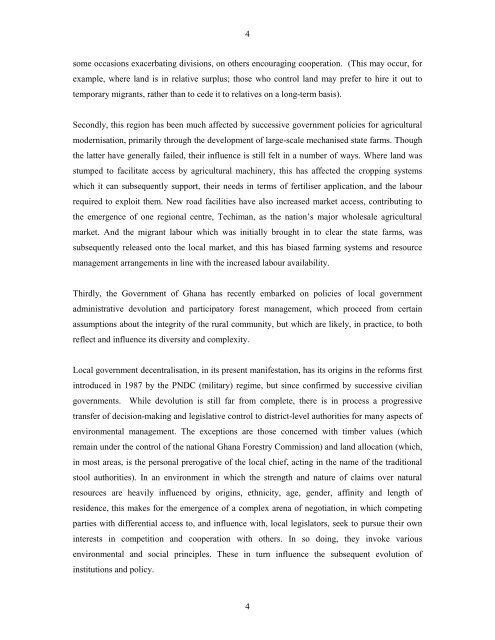Poverty Dimensions of Public Governance and Forest Management ...
Poverty Dimensions of Public Governance and Forest Management ...
Poverty Dimensions of Public Governance and Forest Management ...
Create successful ePaper yourself
Turn your PDF publications into a flip-book with our unique Google optimized e-Paper software.
4<br />
some occasions exacerbating divisions, on others encouraging cooperation. (This may occur, for<br />
example, where l<strong>and</strong> is in relative surplus; those who control l<strong>and</strong> may prefer to hire it out to<br />
temporary migrants, rather than to cede it to relatives on a long-term basis).<br />
Secondly, this region has been much affected by successive government policies for agricultural<br />
modernisation, primarily through the development <strong>of</strong> large-scale mechanised state farms. Though<br />
the latter have generally failed, their influence is still felt in a number <strong>of</strong> ways. Where l<strong>and</strong> was<br />
stumped to facilitate access by agricultural machinery, this has affected the cropping systems<br />
which it can subsequently support, their needs in terms <strong>of</strong> fertiliser application, <strong>and</strong> the labour<br />
required to exploit them. New road facilities have also increased market access, contributing to<br />
the emergence <strong>of</strong> one regional centre, Techiman, as the nation’s major wholesale agricultural<br />
market. And the migrant labour which was initially brought in to clear the state farms, was<br />
subsequently released onto the local market, <strong>and</strong> this has biased farming systems <strong>and</strong> resource<br />
management arrangements in line with the increased labour availability.<br />
Thirdly, the Government <strong>of</strong> Ghana has recently embarked on policies <strong>of</strong> local government<br />
administrative devolution <strong>and</strong> participatory forest management, which proceed from certain<br />
assumptions about the integrity <strong>of</strong> the rural community, but which are likely, in practice, to both<br />
reflect <strong>and</strong> influence its diversity <strong>and</strong> complexity.<br />
Local government decentralisation, in its present manifestation, has its origins in the reforms first<br />
introduced in 1987 by the PNDC (military) regime, but since confirmed by successive civilian<br />
governments. While devolution is still far from complete, there is in process a progressive<br />
transfer <strong>of</strong> decision-making <strong>and</strong> legislative control to district-level authorities for many aspects <strong>of</strong><br />
environmental management. The exceptions are those concerned with timber values (which<br />
remain under the control <strong>of</strong> the national Ghana <strong>Forest</strong>ry Commission) <strong>and</strong> l<strong>and</strong> allocation (which,<br />
in most areas, is the personal prerogative <strong>of</strong> the local chief, acting in the name <strong>of</strong> the traditional<br />
stool authorities). In an environment in which the strength <strong>and</strong> nature <strong>of</strong> claims over natural<br />
resources are heavily influenced by origins, ethnicity, age, gender, affinity <strong>and</strong> length <strong>of</strong><br />
residence, this makes for the emergence <strong>of</strong> a complex arena <strong>of</strong> negotiation, in which competing<br />
parties with differential access to, <strong>and</strong> influence with, local legislators, seek to pursue their own<br />
interests in competition <strong>and</strong> cooperation with others. In so doing, they invoke various<br />
environmental <strong>and</strong> social principles. These in turn influence the subsequent evolution <strong>of</strong><br />
institutions <strong>and</strong> policy.<br />
4
















